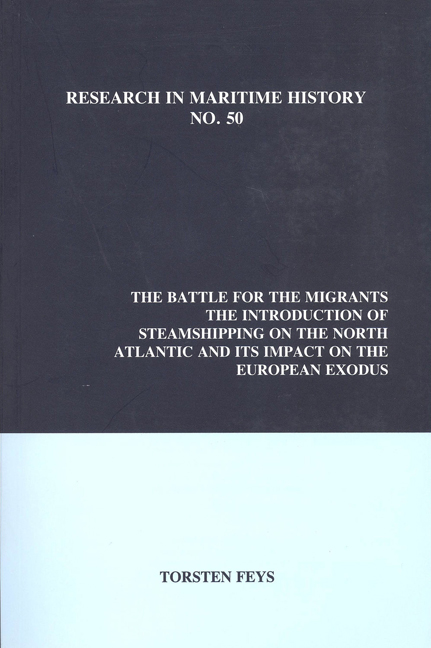 The Battle for the Migrants
The Battle for the Migrants from Part II - The Impact of Steam Shipping on Transatlantic Migration, 1870-1914
Shipping companies were key actors in implementing immigration laws, especially with the growing trend to make the lines responsible for keeping “undesired” groups out of the US by making the cost of detention and deportation increasingly expensive. Previous studies of American immigration have too often focused on congressional debates and the bills enacted, but there are few discussions of their enforcement. The failure to introduce a literacy test has led many authors to conclude that the Immigration Restriction League (IRL), with its emphasis on eugenic theories, had little influence on policy. Yet statements by Ellis Island Supervisor John Weber show that “scientifically based” prejudices towards the “new” immigrants existed before the literacy test was even considered by Congress. Officials at the control stations designed ways to use existing laws to block the entry of “undesirables.” The failure to enact a literacy test notwithstanding, the racist approach gained ground. The introduction of the “list of races and people” in 1898 further divided the growing influx of Europeans into various degrees of whiteness.1 As the proportion of migrants from southern and eastern Europe surpassed those from northern and western Europe by 1896, calls for restrictions based on the racist notion that the new wave threatened the “integrity” of the American race and institutions became louder. While the efforts of the shipping companies to prevent the passage of restrictive legislation up to 1914 will be discussed in this chapter, the principal focus will be on how they blocked the implementation of the laws.
Immigration Policies as Implemented at Ellis Island
Policies under Herman Stump and Joseph Senner, 1893-1897
While fierce debates about further restrictions took place in Washington, the New York Commissioners of Immigration seemed quite happy to use laws passed in 1891 and 1893 to stem the influx of new migrants. In particular, the “likely to become a public charge” (LPC) clause allowed inspectors to reject migrants they deemed undesirable without requiring too much evidence. Under the leadership of Commissioner General of Immigration Herman Stump and his deputy, Joseph Senner, detentions and deportations increased in the mid-1890s. W.H. van den Toorn reported that tighter controls at Ellis Island were swelling their maintenance bills. For instance, at the end of 1894, 138 of the 230 passengers on Amsterdam were detained.
To save this book to your Kindle, first ensure [email protected] is added to your Approved Personal Document E-mail List under your Personal Document Settings on the Manage Your Content and Devices page of your Amazon account. Then enter the ‘name’ part of your Kindle email address below. Find out more about saving to your Kindle.
Note you can select to save to either the @free.kindle.com or @kindle.com variations. ‘@free.kindle.com’ emails are free but can only be saved to your device when it is connected to wi-fi. ‘@kindle.com’ emails can be delivered even when you are not connected to wi-fi, but note that service fees apply.
Find out more about the Kindle Personal Document Service.
To save content items to your account, please confirm that you agree to abide by our usage policies. If this is the first time you use this feature, you will be asked to authorise Cambridge Core to connect with your account. Find out more about saving content to Dropbox.
To save content items to your account, please confirm that you agree to abide by our usage policies. If this is the first time you use this feature, you will be asked to authorise Cambridge Core to connect with your account. Find out more about saving content to Google Drive.